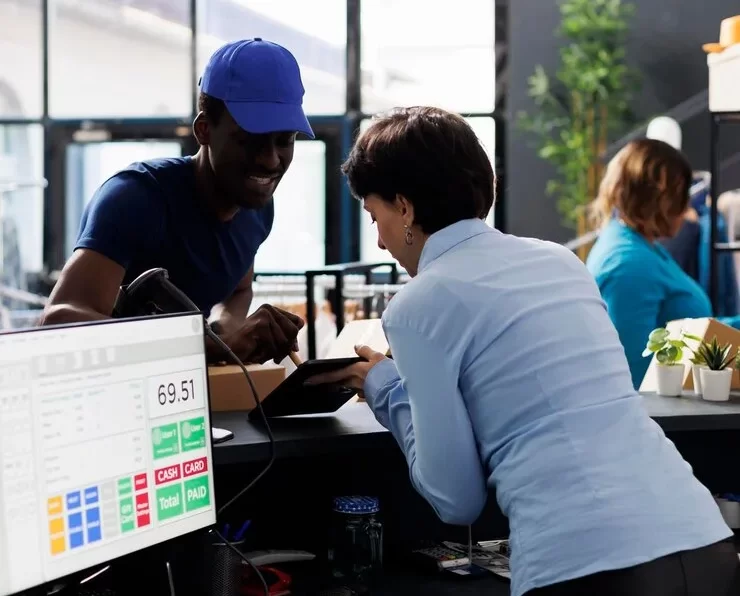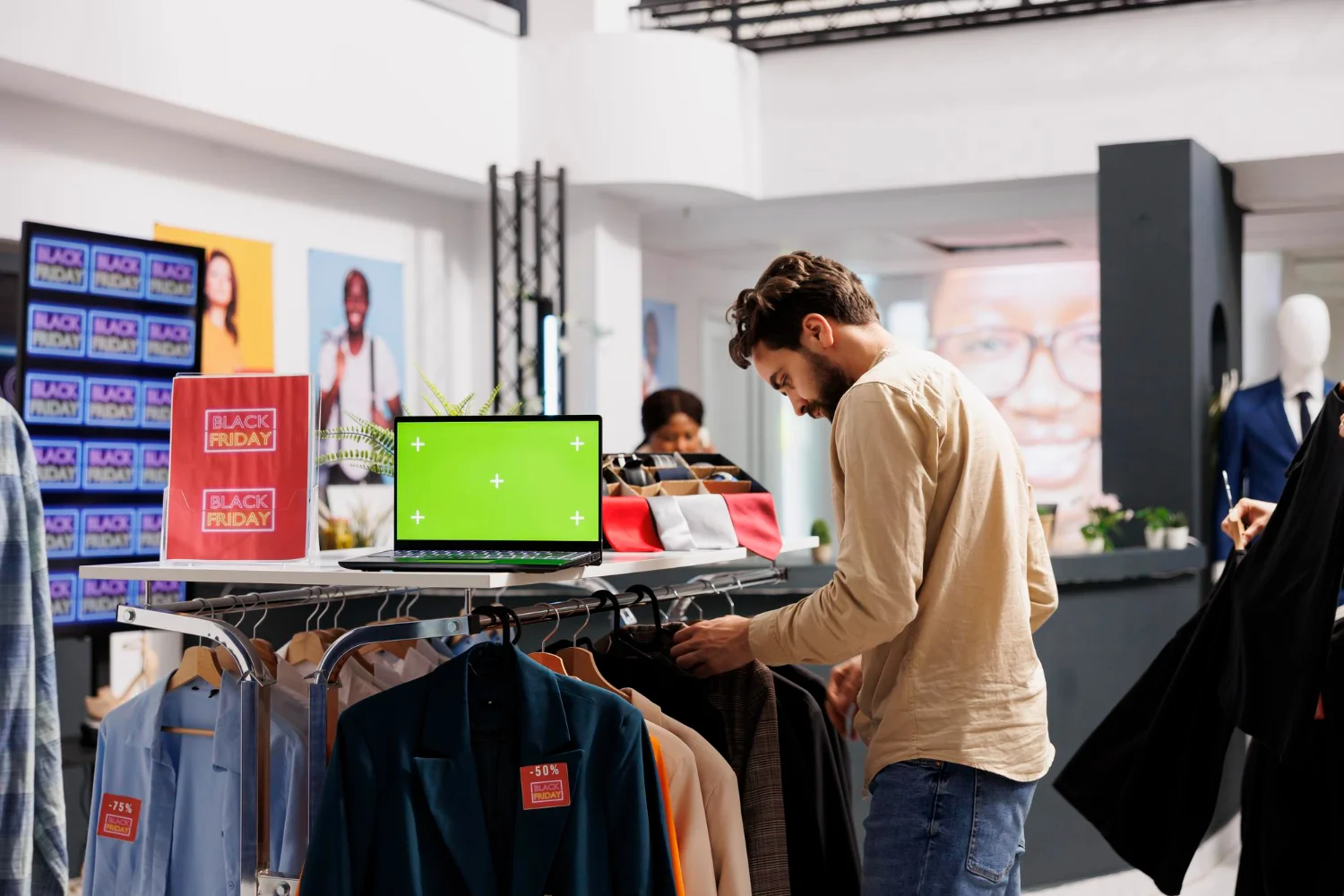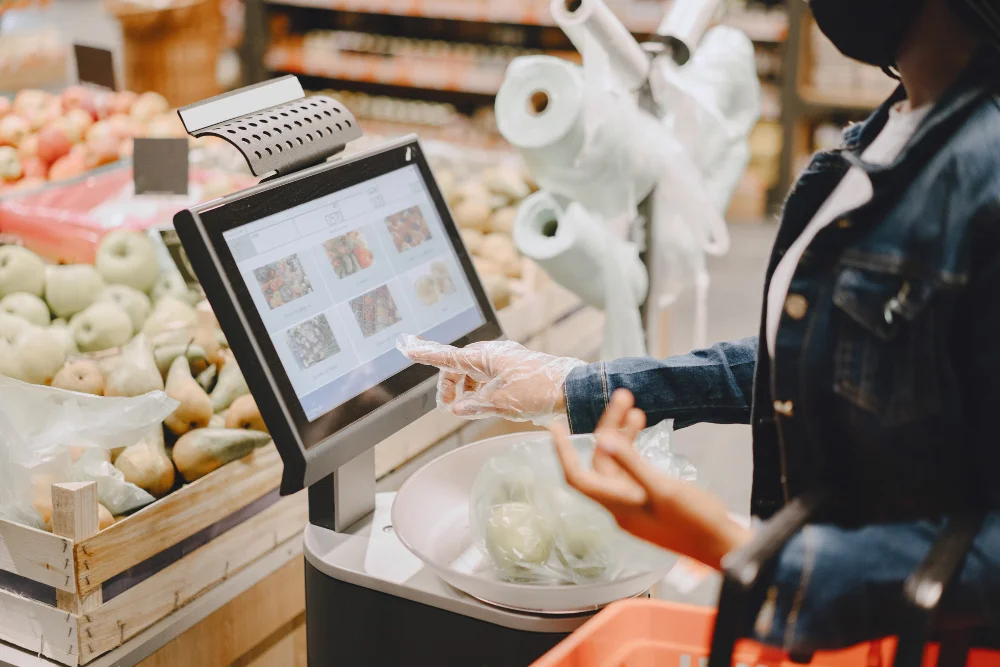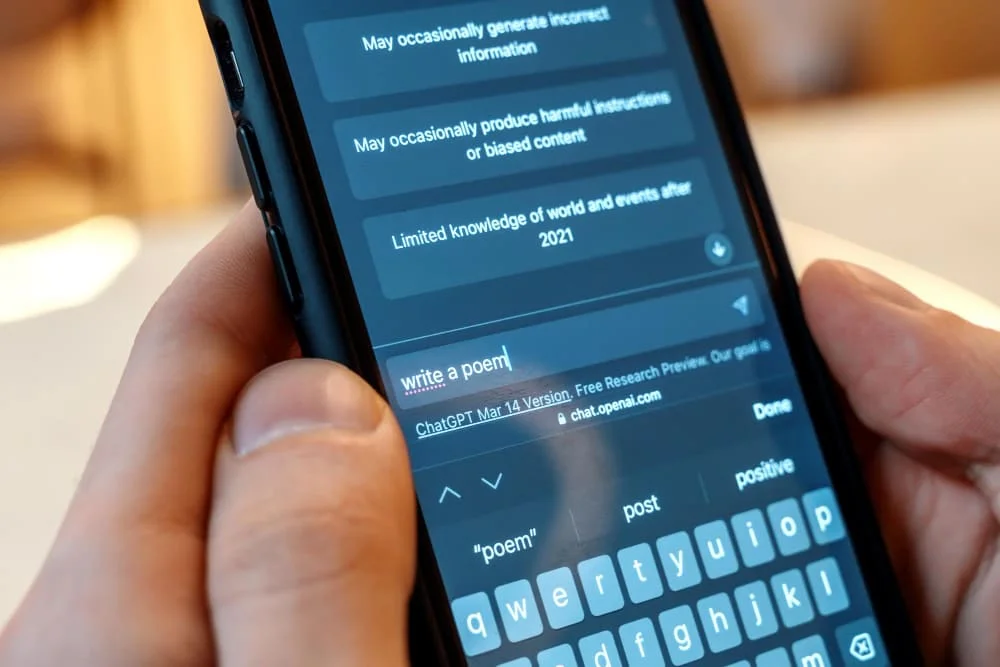In the rapidly evolving retail industry, customer expectations have reached new heights. Today’s consumers expect seamless, personalized, and efficient shopping experiences, both online and offline. Retail software development plays a pivotal role in shaping these experiences, enabling businesses to meet and exceed customer demands. From personalized shopping recommendations powered by artificial intelligence (AI) to streamlined payment systems and real-time inventory tracking, modern software solutions are transforming how retailers interact with their customers.
The rise of eCommerce and digital shopping platforms has shifted the way customers shop, while technology adoption in brick-and-mortar stores has further enhanced convenience and engagement. Custom retail software development enables businesses to create tailored solutions that not only boost operational efficiency but also elevate the overall customer experience. With features like omnichannel integration, mobile applications, and AI-driven automation, retailers can offer customers personalized, frictionless experiences across various touchpoints.
In this blog, we’ll explore how retail software development is revolutionizing the customer journey, from improved personalization to more responsive customer service. We’ll also discuss the key trends shaping the future of retail technology and how businesses can harness these innovations to remain competitive in an increasingly digital marketplace.
Evolution of Customer Experience in Retail Industry
The retail industry has witnessed dramatic shifts in customer experience over the years. Driven by technological advancements and changing consumer expectations, customer experience has evolved from a simple transactional exchange to a dynamic, personalized journey. For businesses, keeping up with these changes is essential to stay competitive, and this is where Cenozic, with its expertise in software development, plays a pivotal role in transforming customer experiences in retail.
1. Early Stages: Traditional Retail Experience
Initially, customer experience in retail was straightforward—shoppers visited physical stores, interacted with sales associates, and made purchases based on in-store displays and word of mouth. The interaction was minimal, with little or no customization. Businesses operated in a brick-and-mortar setup, which limited their ability to track customer preferences and behavior.
2. Rise of E-commerce and Digital Transformation
As the internet became more accessible, e-commerce emerged as a game changer in the retail sector. This shift allowed businesses to reach global audiences, but it also raised customer expectations. Consumers started demanding more convenience, variety, and personalized experiences. Companies had to adapt, and digital platforms became essential tools in meeting these evolving needs. Retailers began leveraging websites and online stores, integrating e-commerce solutions to streamline transactions and offer better product discovery.
Cenozic’s role here was crucial in building custom e-commerce platforms that could integrate seamlessly with existing systems, provide real-time inventory management, and offer a user-friendly interface, paving the way for better engagement with customers.
3. Omnichannel Approach: Bridging Online and Offline Experiences
As customers began shopping online, they still valued the physical store experience. Retailers recognized the need for an omnichannel approach to connect the two worlds. This meant offering a seamless experience for customers, whether they were shopping online, on mobile devices, or in physical stores. An omnichannel experience allowed customers to check product availability online before visiting a store, use mobile apps to access promotions, or have the flexibility to order online and pick up in-store.

Cenozic helps businesses thrive by creating user-friendly omnichannel retail software solutions designed to seamlessly enhance your operations. These solutions ensured that customer data, inventory management, and promotional offers were consistent across all platforms, enhancing the customer journey and promoting loyalty.
4. The Era of Personalization and AI
As technology advanced further, so did customer expectations. Consumers now wanted more than just convenience; they desired highly personalized experiences. The rise of artificial intelligence (AI) and machine learning (ML) allowed businesses to offer real-time product recommendations based on past purchases and browsing behavior. Personalized emails, dynamic pricing, and targeted promotions became standard practices.
Cenozic empowered retail businesses to integrate AI-driven solutions into their platforms, creating smart product recommendation engines and personalized customer outreach systems. By analyzing data, businesses could now predict consumer behavior, offer tailor-made experiences, and drive higher sales through targeted marketing efforts.
5. Integration of Mobile Technology
With the advent of smartphones, mobile applications became a key element in shaping the retail experience. Mobile apps provided consumers with the ability to shop on-the-go, receive personalized offers, and even participate in loyalty programs. Retailers recognized the importance of mobile apps in delivering personalized and real-time experiences.
At Cenozic, we specialize in mobile app development for the retail sector, offering businesses the opportunity to build customized, user-friendly apps that connect customers to their brands, regardless of location. These apps enhance customer engagement, providing a direct communication channel for offers, loyalty programs, and real-time notifications.
6. The Future: Immersive Experiences with AR/VR
Looking ahead, the retail industry is poised for even greater innovation. Augmented reality (AR) and virtual reality (VR) are expected to play a significant role in customer experiences. With AR, customers can try products virtually before making a purchase, while VR can simulate in-store experiences online. These immersive experiences allow businesses to connect with customers on a deeper level and provide them with unique ways to shop.
Cenozic stays ahead of the curve by integrating AR/VR technologies into retail software solutions. By doing so, we enable retailers to offer cutting-edge customer experiences that not only engage consumers but also drive loyalty and conversions.
Role of Retail Software Development in Enhancing Customer Experience
Custom retail software plays a pivotal role in enhancing customer experience by providing tailored solutions that align with both business needs and consumer preferences. With the growing importance of delivering a seamless, personalized, and efficient experience, retailers are increasingly turning to custom software to streamline operations, improve engagement, and ultimately boost customer satisfaction. Here are some key ways in which custom retail software enhances customer experience:
1. Personalized Shopping Experience
Custom retail software enables businesses to gather and analyze customer data, such as purchase history, browsing behavior, and preferences. This data can then be used to create personalized recommendations and marketing strategies, offering customers the products and promotions that are most relevant to them. Whether through personalized product suggestions on a website, targeted emails, or loyalty rewards based on shopping patterns, custom software helps retailers tailor their offerings to meet individual customer needs, creating a more enjoyable and engaging shopping experience.
2. Omnichannel Integration
In today’s retail landscape, customers expect a seamless experience across all touchpoints—whether shopping in-store, online, or through a mobile app. Custom retail software allows businesses to integrate these various channels, ensuring consistency in pricing, inventory management, and customer service. This omnichannel approach ensures that customers can move between platforms without friction, for example, checking stock in a local store via a mobile app or ordering online and picking up in-store. This level of convenience enhances customer satisfaction and encourages brand loyalty.
3. Faster Checkout Process
Speed and convenience are critical in today’s retail environment. Custom software solutions streamline the checkout process by integrating mobile payments, digital wallets, and other technologies like contactless payments. Additionally, features like one-click checkout and auto-filled forms can reduce friction and ensure a faster, smoother transaction experience. Faster checkout not only improves customer experience but can also reduce cart abandonment rates, a significant challenge for online retailers.
4. Inventory and Supply Chain Management
Custom retail software allows businesses to optimize inventory management, reducing the likelihood of stockouts or overstocking. Real-time updates on inventory levels, automated reordering, and supply chain tracking ensure that products are available when customers want them. Additionally, businesses can use custom software to track and predict demand patterns, ensuring that stock levels are adjusted based on seasonality or promotional activities, which enhances the overall customer experience by preventing delays and backorders.
5. Customer Support Integration
Another critical aspect of customer experience is support. Custom retail software often includes integrated customer service features, such as live chat, ticketing systems, and AI-powered chatbots that provide instant responses to customer inquiries. By streamlining customer service operations and offering timely assistance, businesses can improve customer satisfaction and build a stronger relationship with their audience.
6. Loyalty Programs and Rewards
Custom retail software can incorporate advanced loyalty programs that reward customers for repeat purchases, social media engagement, or reviews. By offering tailored rewards and promotions based on customer behavior, businesses can encourage brand loyalty, increase customer retention, and drive long-term growth. These programs are personalized through data insights, ensuring that rewards are meaningful and valuable to individual customers.
7. Analytics and Reporting
Custom retail software allows businesses to collect and analyze data about customer behavior, sales trends, and inventory. This data can be used to make informed decisions on everything from product offerings to pricing strategies. With better insights, businesses can enhance the customer experience by quickly responding to emerging trends, ensuring that they remain competitive and relevant in the market.
Custom retail software enables businesses to stay ahead of the competition by providing personalized, efficient, and seamless experiences that meet customer expectations. From personalized shopping and streamlined checkout to omnichannel integration and data-driven decisions, custom software plays an essential role in transforming the customer journey and driving brand loyalty. For businesses looking to enhance customer satisfaction and optimize their operations, investing in custom retail software solutions is a strategic step toward long-term success.
The Future of Customer Experience in Retail
The future of customer experience in retail is rapidly evolving as technological advancements and changing consumer expectations drive retailers to adopt innovative solutions. Today, customers demand more than just high-quality products—they expect seamless, personalized, and efficient shopping experiences. Retailers who can deliver on these expectations will remain competitive, while those who fail to adapt may risk losing relevance in an increasingly digital world.

1. Hyper-Personalization:
The future of customer experience in retail revolves around hyper-personalization, where businesses use data-driven insights to offer tailored experiences for each customer. With the help of AI and machine learning, retailers can analyze customer behavior, preferences, and previous interactions to provide personalized product recommendations, promotions, and content. This personalized approach enhances the customer’s journey and fosters loyalty, as shoppers feel valued and understood.
2. Omnichannel Shopping:
As consumers continue to shop across multiple devices and platforms, retailers must create a unified, omnichannel shopping experience. This means integrating physical stores, e-commerce platforms, mobile apps, and social media to provide a seamless transition for customers, regardless of where or how they shop. Whether a consumer is browsing a website, purchasing through an app, or buying in-store, they expect consistent pricing, stock availability, and service.
3. Augmented Reality (AR) and Virtual Reality (VR):
AR and VR are becoming game-changers in retail, providing customers with immersive experiences that were once unimaginable. For instance, virtual try-ons for apparel or makeup allow customers to visualize products without physically trying them. AR can also be used in-store to help customers navigate the store, visualize how products will look in their home environment, or receive instant product details via their smartphones. These interactive features enhance engagement and improve the shopping experience.
4. AI and Chatbots for Enhanced Customer Support:
Artificial intelligence (AI) is transforming customer service in retail, especially through chatbots and virtual assistants. These AI-powered tools can offer real-time, personalized customer support 24/7, answering queries, assisting with transactions, and providing product recommendations. By automating routine customer service tasks, AI frees up human staff to focus on more complex issues while ensuring customers get immediate help when they need it.
5. Seamless Payment Experiences:
The way customers pay is changing, and retailers are responding by offering faster, safer, and more convenient payment options. Mobile wallets, biometric authentication, and contactless payment solutions are becoming mainstream, allowing customers to complete transactions quickly and securely. The future will see more emphasis on frictionless payment experiences, enabling customers to check out with minimal effort, whether they are shopping online, in-store, or through mobile apps.
6. Sustainability and Ethical Practices:
As consumers grow more conscious of environmental issues, retailers are prioritizing sustainability and ethical business practices. From eco-friendly packaging to sustainable sourcing of products, the future of customer experience in retail will be deeply intertwined with a brand’s commitment to sustainability. Customers are increasingly aligning themselves with brands that share their values, which means retail businesses must be transparent about their practices and offer products that reflect their ethical stance.
By leveraging advancements in AI, AR/VR, omnichannel strategies, and sustainability practices, the retail industry is shaping the future of customer experience. For businesses, staying ahead of these trends will be crucial to remain relevant and competitive in a fast-changing market.
How Retail Software Enhances Personalization
In the fast-paced and ever-evolving retail industry, personalization has become a key factor in customer satisfaction and loyalty. Retail software plays a crucial role in enabling businesses to personalize customer experiences by using data-driven insights. By leveraging consumer data, retailers can offer tailored products, services, and experiences, creating a deeper connection with their customers.
1. Data Collection and Analysis:
Modern retail software tools collect vast amounts of data from multiple touchpoints, including online interactions, in-store visits, purchase history, and social media activities. This data provides valuable insights into customer behavior, preferences, and purchase patterns. By analyzing this information, retailers can build detailed customer profiles that help them understand individual needs and desires. For example, a clothing retailer can use past purchase data to recommend similar styles, sizes, or seasonal collections, increasing the chances of a successful sale.
2. Customer Segmentation:
Retail software allows businesses to segment their customer base into specific groups based on demographics, behavior, or interests. With segmentation, retailers can create targeted marketing campaigns that resonate with each group. For example, a retailer might offer discounts or promotions for a particular age group or geographic location, further enhancing the relevance of their marketing efforts. Personalized offers are more likely to lead to conversions, making segmentation a powerful tool in improving sales.
3. Real-time Personalization:
Personalization is most effective when it is timely and relevant. Retail software can provide real-time recommendations based on current customer activity. For example, if a customer adds a product to their cart but doesn’t complete the purchase, personalized reminders or incentives like a discount offer can be sent to encourage them to finalize the transaction. Real-time interactions help maintain customer engagement, ensuring they receive the most relevant products and services when they need them.
4. Omnichannel Integration:
Modern retail software is designed to provide a consistent experience across all channels—be it in-store, online, or mobile. By integrating customer data across all platforms, businesses can offer a seamless experience that personalizes interactions based on where the customer is shopping. For example, a customer browsing a retailer’s website can receive personalized offers that are also available in the physical store, enhancing both online and offline shopping experiences. This omnichannel approach ensures that personalization isn’t confined to one medium, leading to stronger customer loyalty.
5. AI-Powered Recommendations:
Artificial intelligence (AI) is a powerful tool in personalizing customer experiences. Retail software powered by AI can analyze past behavior and predict future needs, delivering highly targeted product recommendations. For instance, e-commerce platforms often use AI algorithms to suggest products based on a customer’s previous purchases or browsing history. These AI-driven recommendations improve user engagement, drive more sales, and create a personalized shopping experience that feels intuitive and tailored to each individual.
The Power of Retail Software
In today’s highly competitive retail market, customers demand more than just a product; they expect personalized experiences that resonate with their preferences, behaviors, and shopping habits. Personalization is the key to building stronger customer relationships, driving sales, and enhancing loyalty. Cenozic, a leader in retail software development, harnesses the power of data-driven solutions to enable retailers to deliver truly personalized experiences at every touchpoint.

1. Harnessing Data to Understand Consumer Behavior
Personalization starts with data. Retailers have access to vast amounts of data through customer interactions across multiple platforms—whether it’s website visits, past purchases, or app usage. By collecting and analyzing this data, Cenozic helps businesses better understand their customers, segment audiences based on their preferences, and deliver tailored experiences that increase conversion rates.
For example, Cenozic’s AI and machine learning (ML) algorithms are used to analyze customer data and predict future behaviors. By understanding which products are likely to interest each customer based on their browsing history or social media activity, businesses can offer personalized product recommendations. This not only enhances the shopping experience but also drives higher sales, as customers are presented with products they are more likely to purchase.
2. Customized Recommendations and Dynamic Pricing
One of the most powerful ways Cenozic enables personalization is through customized product recommendations. By leveraging customer data and applying AI-driven recommendation engines, Cenozic can help businesses offer real-time, relevant product suggestions. These recommendations can be displayed on the homepage, within emails, or even during the checkout process.
Moreover, Cenozic integrates dynamic pricing mechanisms in retail software to provide customers with price adjustments based on their buying patterns or purchasing history. For instance, loyal customers may receive discounts, or product prices might adjust depending on demand. This real-time personalization ensures customers feel valued, increasing the likelihood of repeat purchases.
3. Targeted Marketing Campaigns and Customer Segmentation
Another critical aspect of personalization is targeted marketing. Retailers can use the data collected to create segmented audiences, allowing them to send tailored promotions, offers, and advertisements to specific groups of customers. Cenozic helps businesses implement customer segmentation strategies, ensuring that each customer receives marketing messages relevant to their interests.
By using customer profiles, businesses can deliver personalized email campaigns that highlight products similar to previous purchases or showcase promotions based on browsing behavior. This approach results in a more engaged customer base, higher click-through rates, and ultimately, greater customer retention.
4. Personalized Shopping Experience Across Channels
In addition to personalized recommendations and marketing, Cenozic ensures a consistent experience across all customer touchpoints—whether online, in-store, or through mobile apps. Through omnichannel retail software solutions, Cenozic enables businesses to track customer behavior across multiple channels and personalize interactions at every stage of the buying journey.
For example, a customer who browses products online can receive personalized offers via a mobile app or an email. Similarly, in-store experiences can be enhanced through personalized offers based on the customer’s online activity, bridging the gap between online and offline experiences.
5. The Power of Data Analytics and Reporting
Cenozic empowers businesses to constantly refine their personalization strategies by providing robust analytics and reporting capabilities. Through real-time insights, businesses can track the success of personalized campaigns and understand what resonates most with their audience. Whether it’s analyzing customer engagement, conversion rates, or product preferences, Cenozic’s data-driven approach allows businesses to adapt and optimize their strategies.
Cenozic’s data-driven retail software solutions enable businesses to provide highly personalized shopping experiences that engage customers, foster loyalty, and drive sales. By leveraging advanced analytics, AI/ML algorithms, and targeted marketing strategies, Cenozic helps retailers stay ahead of the curve in delivering exceptional, individualized experiences across all channels. Through personalization, Cenozic is helping redefine the future of retail, turning ordinary shopping journeys into extraordinary, tailored experiences.
Automation and AI in Retail Software
In the fast-paced world of retail, delivering a seamless shopping experience that meets customer expectations is paramount. Cenozic, a leading provider of innovative retail software solutions, is revolutionizing the shopping experience by integrating automation and artificial intelligence (AI). These technologies are streamlining operations, enhancing customer satisfaction, and ultimately driving business growth.
Here’s how Cenozic is using these cutting-edge technologies to transform the retail landscape:
1. Personalized Shopping Experience
Cenozic’s retail software solutions leverage AI-driven algorithms to offer hyper-personalized recommendations for customers. By analyzing customer data, such as browsing history, purchase patterns, and preferences, the system can predict which products a customer might be interested in. This level of personalization is made possible through machine learning (ML) and natural language processing (NLP) technologies, enabling real-time customization of the shopping experience across online and mobile platforms. Personalization not only enhances customer satisfaction but also boosts sales conversion rates.
For example, Cenozic’s AI-powered recommendation engines can suggest relevant products to a customer based on their preferences, thereby increasing the chances of a sale. This can happen seamlessly in the background without customers even realizing the level of sophistication driving their experience.
2. Inventory Management Automation
AI is also playing a vital role in inventory management automation. Cenozic’s retail software uses predictive analytics to manage stock levels based on historical data and consumer demand trends. By automating inventory forecasting, retailers can minimize stockouts and overstocks, ensuring that they have the right products available at the right time. The system automatically updates stock levels in real-time, providing retailers with better insights and helping them make data-driven decisions about their product offerings.
This automation reduces human errors, saves time, and enhances operational efficiency. For retailers, it means fewer out-of-stock scenarios, which translates into increased sales and customer satisfaction.
3. Chatbots and Virtual Assistants
In the realm of customer service, AI-powered chatbots and virtual assistants are transforming the way customers interact with retailers. Cenozic specializes in developing chatbots and integrating these tools into retail software to handle routine customer queries, provide instant product recommendations, and even assist with the checkout process. Chatbots offer immediate support and can even help with order tracking, returns, and exchanges.
Not only does this streamline the shopping process for customers, but it also frees up human agents to handle more complex tasks, thereby improving overall efficiency. With chatbots working 24/7, retailers can provide round-the-clock service, enhancing the customer experience.
4. Automated Checkout and Payment Systems
AI and automation also play a significant role in the checkout process. Cenozic’s retail solutions integrate AI-based checkout systems that simplify and speed up transactions. These systems enable features like cashier-less checkouts, where customers can simply scan items using their mobile phones, and the system automatically processes the payment. By eliminating the need for manual intervention, the checkout process becomes faster, reducing customer wait times and improving satisfaction.

Additionally, automated fraud detection tools powered by AI ensure that payment transactions are secure, minimizing the risks of fraudulent activities and protecting both retailers and customers.
5. Enhanced Customer Insights with Data Analytics
Cenozic’s AI-powered retail software provides retailers with deep insights into customer behavior. By analyzing large volumes of customer interaction data, businesses can gain a comprehensive understanding of customer preferences, purchasing patterns, and even sentiment. This allows for better decision-making and the ability to anticipate customer needs before they arise.
For example, AI can identify trends like the most popular products during certain times of the year or the types of customers that prefer specific products. Retailers can use this data to improve marketing strategies, stock products more effectively, and create targeted offers that resonate with different customer segments.
6. Automated Marketing Campaigns
Through automation, Cenozic enables retailers to run automated marketing campaigns that target customers based on their behavior, location, and preferences. By using customer data, the system can trigger specific actions such as sending personalized emails, push notifications, or SMS messages with tailored promotions. This not only increases engagement but also optimizes the timing of marketing efforts, ensuring that customers receive relevant content when they’re most likely to make a purchase.
7. Streamlining Supply Chain Operations
AI and automation also extend to the supply chain management process. Cenozic’s software helps retailers optimize logistics, improve forecasting, and reduce delivery times by automating supply chain workflows. By leveraging machine learning algorithms and real-time data, retailers can streamline their operations, reducing costs while improving delivery accuracy. Automation further improves this process by integrating seamlessly with warehouse management systems, ensuring that items are processed, packaged, and shipped without delays.
8. Customer Behavior Prediction and Dynamic Pricing
Cenozic’s retail solutions employ predictive analytics to forecast customer behavior and dynamically adjust prices based on factors like demand fluctuations, market conditions, and customer segments. By analyzing patterns and trends, the system automatically adjusts pricing in real-time, ensuring that customers always receive competitive prices, while retailers maximize their revenue. This form of dynamic pricing helps businesses stay ahead in a highly competitive market, giving them the agility to adjust to changes in demand quickly.
How Cenozic Optimizes Retail Software Development
Cenozic offers comprehensive retail software development services that can significantly enhance your business operations, streamline the shopping experience, and improve customer satisfaction. With a deep understanding of the retail industry and expertise in the latest technologies, Cenozic helps businesses stay ahead in the competitive retail landscape. Cenozic’s expertise in AI, automation, and cloud technologies guarantees that your retail business stays competitive, efficient, and customer-centric. Here’s how Cenozic can assist in your retail software development journey:
1. Custom Software Development
Cenozic specializes in developing custom retail software tailored to your specific business needs. Whether it’s a cloud-based platform, eCommerce solutions, or an inventory management system, Cenozic builds software that aligns with your business processes. By understanding your business goals, Cenozic ensures that the developed software is not just an off-the-shelf solution but a custom-built platform that drives value and scalability.
2. AI and Machine Learning Integration
Artificial Intelligence (AI) and Machine Learning (ML) are pivotal in shaping the retail industry. Cenozic leverages these technologies to develop systems that offer personalized shopping experiences, dynamic pricing, customer behavior predictions, and advanced inventory management. By integrating AI, Cenozic helps businesses deliver smarter, data-driven experiences that increase conversions and customer loyalty.
3. Mobile App Development
In today’s mobile-first world, having a mobile application for your retail business is crucial. Cenozic develops feature-rich, user-friendly mobile apps for iOS and Android platforms. These apps are designed to provide seamless shopping experiences, including secure payment gateways, real-time inventory updates, and push notifications for promotions, enhancing engagement and sales.
4. Automation of Retail Operations
Cenozic helps retailers optimize their processes through automation. From inventory tracking and order management to customer service interactions, Cenozic integrates automation to enhance operational efficiency and reduce human error. Automation leads to faster order processing, more accurate stock levels, and better management of customer queries through AI-driven chatbots.
5. Integration with Third-Party Solutions
Cenozic offers seamless integration of your retail software with third-party services such as CRM systems, payment gateways, shipping carriers, and analytics tools. This ensures that your software ecosystem is unified, making it easier to manage and track operations from a single platform.
6. Cloud-Based Solutions
Cenozic helps retailers take advantage of cloud-based software for better scalability, flexibility, and cost-efficiency. By hosting retail applications in the cloud, businesses can expand their operations without the need for heavy infrastructure investments. Cloud solutions ensure secure data storage, easy access, and faster updates, providing a seamless experience for both customers and businesses. According to McKinsey, Many retailers are shifting to cloud-based systems to improve scalability and enhance operational efficiency. This migration enables them to handle large volumes of data, streamline their operations, and leverage advanced technologies such as AI for predictive analytics, which enhances decision-making and customer personalization.
7. Data Analytics and Reporting
Through advanced data analytics, Cenozic enables retailers to gain valuable insights into customer behavior, purchasing patterns, and sales performance. By leveraging this data, businesses can make informed decisions, optimize marketing campaigns, and offer tailored experiences that resonate with their target audience.
Conclusion
Cenozic is at the forefront of revolutionizing the retail industry by integrating automation and AI into its software solutions. By offering hyper-personalized shopping experiences, automating customer service, improving inventory management, and enhancing marketing efforts, Cenozic helps retailers stay competitive and improve customer satisfaction. These technologies are not just about streamlining operations but also about creating a future-proof shopping experience that anticipates and responds to customers’ evolving expectations. With Cenozic’s AI and automation-driven approach, retailers can enhance every stage of the customer journey, ensuring that shopping is efficient, personalized, and seamless.


 The Future of AI: How Machine Learning is Transforming Businesses
The Future of AI: How Machine Learning is Transforming Businesses  AI in E-commerce: Enhancing Customer Experience & Engagement
AI in E-commerce: Enhancing Customer Experience & Engagement  How AI-Powered Chatbots Are Revolutionizing Customer Support
How AI-Powered Chatbots Are Revolutionizing Customer Support  The Role of AI in Mobile App Development: Smarter and Faster Apps
The Role of AI in Mobile App Development: Smarter and Faster Apps  How To Choose Top Website Development Company In USA
How To Choose Top Website Development Company In USA 